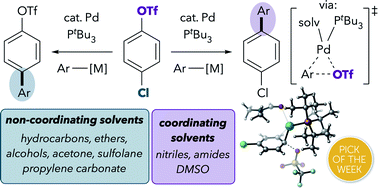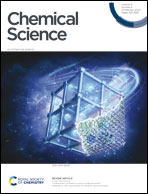Solvent coordination to palladium can invert the selectivity of oxidative addition†
Abstract
Reaction solvent was previously shown to influence the selectivity of Pd/PtBu3-catalyzed Suzuki–Miyaura cross-couplings of chloroaryl triflates. The role of solvents has been hypothesized to relate to their polarity, whereby polar solvents stabilize anionic transition states involving [Pd(PtBu3)(X)]− (X = anionic ligand) and nonpolar solvents do not. However, here we report detailed studies that reveal a more complicated mechanistic picture. In particular, these results suggest that the selectivity change observed in certain solvents is primarily due to solvent coordination to palladium. Polar coordinating and polar noncoordinating solvents lead to dramatically different selectivity. In coordinating solvents, preferential reaction at triflate is likely catalyzed by Pd(PtBu3)(solv), whereas noncoordinating solvents lead to reaction at chloride through monoligated Pd(PtBu3). The role of solvent coordination is supported by stoichiometric oxidative addition experiments, density functional theory (DFT) calculations, and catalytic cross-coupling studies. Additional results suggest that anionic [Pd(PtBu3)(X)]− is also relevant to triflate selectivity in certain scenarios, particularly when halide anions are available in high concentrations.

- This article is part of the themed collections: 2022 ChemSci Pick of the Week Collection, 2022 Chemical Science HOT Article Collection and Most popular 2021 organic chemistry articles, 2021


 Please wait while we load your content...
Please wait while we load your content...